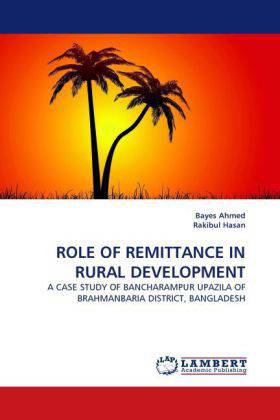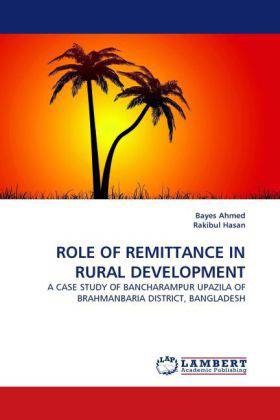
- Afhalen na 1 uur in een winkel met voorraad
- Gratis thuislevering in België vanaf € 30
- Ruim aanbod met 7 miljoen producten
- Afhalen na 1 uur in een winkel met voorraad
- Gratis thuislevering in België vanaf € 30
- Ruim aanbod met 7 miljoen producten
Zoeken
Role of Remittance in Rural Development
A CASE STUDY OF BANCHARAMPUR UPAZILA OF BRAHMANBARIA DISTRICT, BANGLADESH
Bayes Ahmed, Rakibul Hasan
Paperback | Engels
€ 48,45
+ 96 punten
Omschrijving
Over the past 25 years labour migration from Bangladesh has registered a steady increase. From 1990 onwards on an average 2,25,000 Bangladeshis are migrating on short-term employment. The recent trend of the bulk of the migrants is more towards semi and unskilled labour migration. Major outflow of Bangladeshi labour generated significant financial flow to the country in the form of remittance. However, due to increase in the flow of unskilled and semi- skilled labour, remittance is increasing at a much lower rate than the labour flow. Remittance is crucial for Bangladesh's economy. It constitutes almost one-third of the foreign exchange earning. In 1998-99, remittance contributed 22 percent in financing imports. Studies have shown it has strong positive impact on GDP, and also on consumption and investment. This research assesses to identify the role of remittance in rural development. It also evaluates current uses and impacts of remittance, the characteristics of remittance sending and remittance receiving persons. The research also explores the problems and possible potentials in effective uses of remittance for rural development through investment in productive sectors.
Specificaties
Betrokkenen
- Auteur(s):
- Uitgeverij:
Inhoud
- Aantal bladzijden:
- 116
- Taal:
- Engels
Eigenschappen
- Productcode (EAN):
- 9783843368988
- Verschijningsdatum:
- 28/10/2010
- Uitvoering:
- Paperback
- Formaat:
- Trade paperback (VS)
- Afmetingen:
- 152 mm x 229 mm
- Gewicht:
- 181 g

Alleen bij Standaard Boekhandel
+ 96 punten op je klantenkaart van Standaard Boekhandel
Beoordelingen
We publiceren alleen reviews die voldoen aan de voorwaarden voor reviews. Bekijk onze voorwaarden voor reviews.











